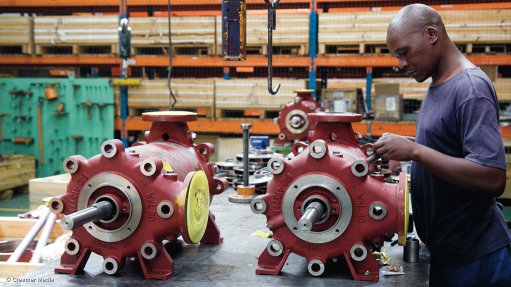
SKILLS NEEDED
Skills development will play a pivotal role in reviving the South African pumps manufacturing industry
Photo by: Creamer Media
The Southern African Pump Systems Development Association (Sapsda) believes that the development of skills in the local manufacturing industry will be vital in reviving the South African pumps manufacturing industry and combating cheap imports.
“There are currently more pumps being imported than locally manufactured; therefore, we are pushing to increase local manufacturing,” outlines Sapsda director Thys Wehmeyer. The main approach to increasing local manufacturing is product designation, which is a lengthy process.
International pumps manufacturers have chosen countries, such as China and India, from which to centralise their pumps manufacturing. “Some of the bigger companies have assembly plants in South Africa, which may be a value-add, but this is not contributing to local skills development,” Sapsda administrative director Maureen Wehmeyer adds.
Therefore, Sapsda’s current focus is the association’s three key pillars: skills development, promoting exports and manufacturing, and promoting black entrepreneurship.
Thys Wehmeyer explains that a key industry conundrum is the decision between increasing local manufacturing or promoting skills development. For Sapsda, skills development is more critical, as, without the requisite skills, local pumps manufacturing will not improve.
However, the pumps industry is losing significant numbers of experienced employees to retirement, while insufficient numbers of new employees enter the system to be trained. As a result, knowledge is lost, he says.
He further avers that skills development is required in not only pumps manufacturing but also related industries, such as electric motors, control panels and fittings, as a pump system caters to these industries.
However, consulting engineers involved in the pumps industry tend to categorise pump systems under different parts and focus on one section at a time. For example, an engineer will focus on the electric motor and a mechanical engineer on the actual pump and “barely communicate” with each other about the different aspects of the pump system, Thys Wehmeyer says.
There is a definite demand for pumps manufacturers and suppliers who have holistic knowledge of pump systems and can select all the appropriate components for the pump. A pump system will not function correctly if an employee does not understand how all the controls and processes work, if the controls are insufficient and the application of the pump system is incorrect; this is one of the biggest problems in the pumping industry, he says.
“Consequently, we are now redeveloping our whole training course, with each sector providing a portion of the pump system training,” he points out. The training course is expected to be completed, and implemented, by the end of this year.
Sapsda aims to train employees to evaluate the entire pumping system holistically, from the electric motor to the pump, to produce a more reliable pumping system that will function to its full potential, claims Thys Wehmeyer.
He also acknowledges that many of the skills required by manufacturers have been lost as a result of manufacturers scaling back or shutting down operations, owing to the impact of cheaper imports.
Designation
Once the training course is finalised and training starts, Sapsda aims to bring all the different manufacturers together to create a cluster for local manufacturing. “Once the manufacturers form a cluster, the product can be designated,” Thys Wehmeyer points out.
The Department of Trade and Industry, for example, “designates specific industries, where tenders should prescribe that only locally manufactured goods with a prescribed minimum threshold for local production will be considered”.
This means that State-owned enterprises (SOEs) and municipalities are required to buy locally manufactured goods for projects to encourage job creation and stimulate the industry. A designation will entail a set period, such as five years, during which the SOEs and municipalities are required to buy the product.
Sapsda believes that this will provide the manufacturers with a short-term advantage over imports, and, consequently, capital to increase manufacturing capacity and improve skills development. The designation will highlight the manufacturing capabilities and capacity of South African foundries and manufacturers.
Meanwhile, several foundries in South Africa are struggling to maintain manufacturing volumes, as many pump manufacturers are importing components rather than acquiring locally manufactured castings, Thys Wehmeyer points out.
“Most important for the success of the pumping industry is the success of the foundries . . . if they go belly up, so will pumps manufacturing. . . ”
He emphasises, therefore, that it is critical that foundries are competitive, otherwise the local pumps industry cannot be competitive internationally. Designation will once again play a pivotal role in maintaining production levels in local foundries.
Broadening Horizon
Sapsda currently has 28 members, and an ongoing initiative is the aim to increase membership by attracting companies in other Southern African Development Community countries. There are currently five association directors, which Sapsda aims to increase to nine. By having nine directors, Sapsda will have greater representation of the associated industries and nine members will ensure a quorum at meetings.
“We did not do a big membership drive until we had all our paperwork together and were registered properly,” illustrates Thys Wehmeyer.
Sapsda organised a golf day earlier this month to raise money for the association and drive membership. The next membership drive will occur at the Electra Mining Exhibition, where Sapsda will distribute information about the association.